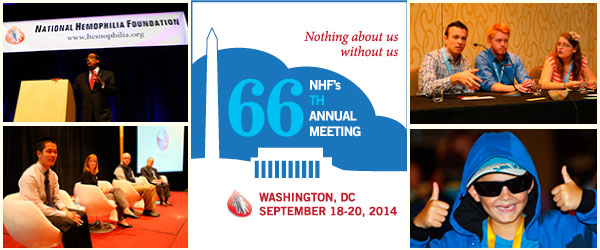 |
In 1994, members of Congress alerted Donna Shalala, the former U.S. health and human services secretary, about their concerns over HIV in the blood supply. In turn, she asked the Institute of Medicine for a study, which they did. Titled HIV and the Blood Supply, it became a call to action that eventually resulted in the passage of the Ricky Ray Relief Fund Act of 1998.
The law was named after the late HIV-positive teenager with hemophilia whose family had their house burned down in Florida because of AIDSphobia. It compensated families of those in the bleeding disorders community who had contracted HIV through tainted blood products.
Many community members continue to live with the after effects of a once-tainted blood supply, which is why sessions were held on the latest in hepatitis C and HIV treatments. Every year the tremendous losses endured are the focus of a session entitled "Remembrance and Celebration of Life."
One young mother lost her infant to an unexpected bleed. Another woman stood by her 18-year-old son, both speaking of the cross-generational impact hemophilia has had on their family, from the uncle who was being mourned to the nephew who was born two years after blood products were deemed safe.
Dana Kuhn attended this year’s session with a heavy heart: this past summer he lost his beloved brother, also a hemophiliac, to hepatitis C just as newer treatments were right around the corner.
Diagnosed with HIV himself three decades ago, he was there not just to remember his brother: "For those who in the past involuntarily gave their lives, which led to a safer blood supply, better therapies, and better and safer prescription products, I will always be grateful and never forget."
An avid cyclist and fundraiser, Barry Haarde is a 48-year-old with severe hemophilia A and HIV who also lost a brother and a brother-in-law, both hemophiliacs as well, to hepatitis C and AIDS. He calls the sessions each year "the only real opportunity we have to gather together and remember and honor our loss."
He hopes that enough money can be raised to dedicate a permanent memorial of remembrance for the community. He’s glad, however, that both the NHF and the Hemophilia Foundation of America (HFA) hold theses sessions each year. However, he adds: "These meetings should not be placed opposite any other meetings. I think that honoring our past losses and sacrifices deserves our undivided attention and attendance."
Greg McClure, a father of two sons with hemophilia, moderated the session with a comforting tone in his voice. His youngest passed in 2007, just 25 years old. His oldest is doing well, and has made him a grandfather two times over. Moderating gives him an opportunity to not only share his experiences, but to also hear the experiences of others: "They need to know that they are not alone in the grieving process."
Val Bias, the chief executive officer of NHF, was an active force in the fight for blood safety, and as someone living with hemophilia, HIV and hepatitis C, he also is keenly aware of what this session means to the community: "That’s what I get up and go to work for every day, those who didn’t make it."






3 Comments
3 Comments